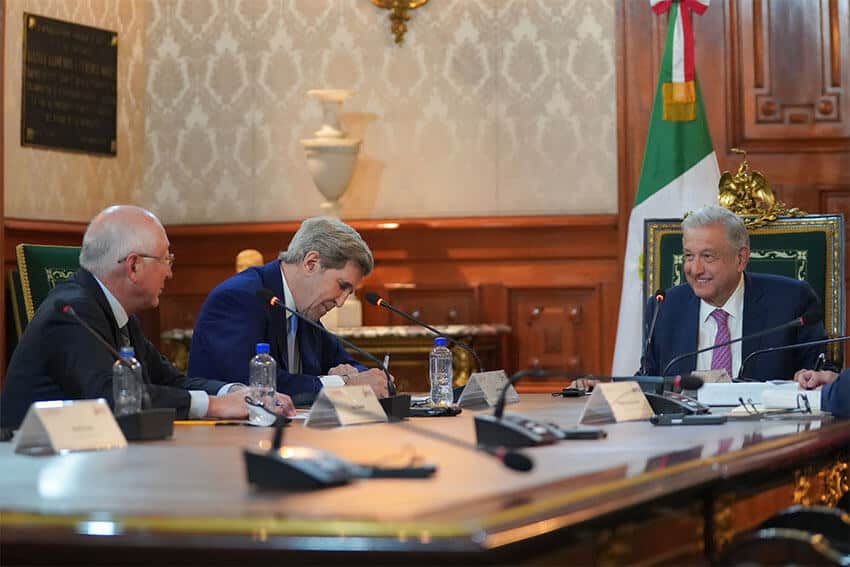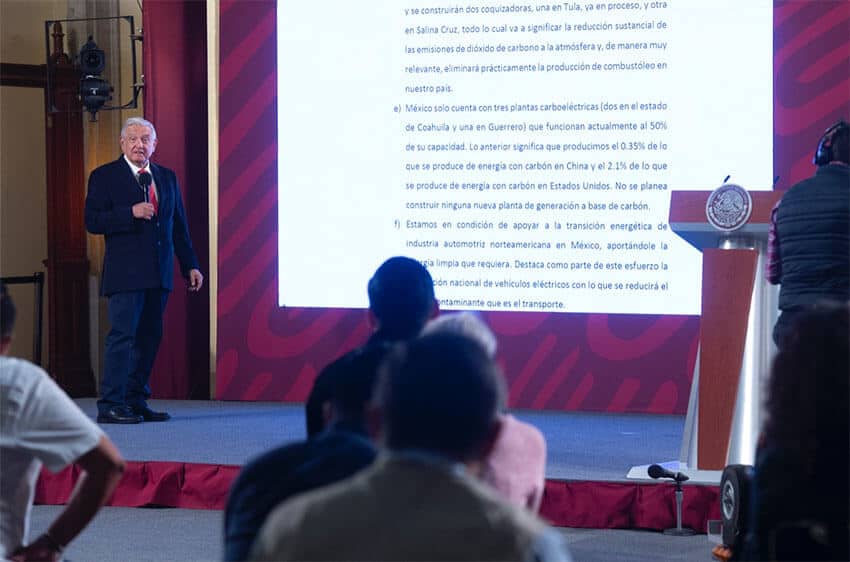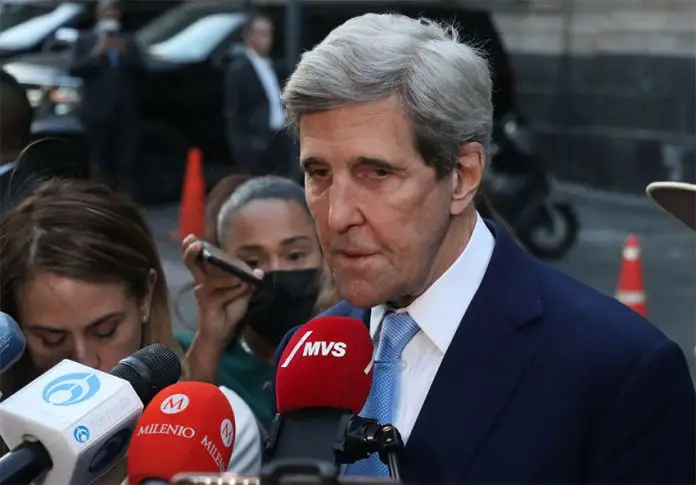President López Obrador insisted that he won’t make changes to his proposed electricity reform a day after a high-ranking United States official said he had committed to doing so.
U.S. Special Presidential Envoy for Climate John Kerry said Thursday that López Obrador pledged to make changes to his constitutional bill in order to encourage investment and promote clean energy, but the president contradicted that assertion Friday morning, declaring that the bill would “stay as it is” because it already takes the United States’ concerns into account.
Speaking to the newspaper Reforma after meeting with López Obrador at the National Palace in Mexico City, Kerry said the president made it clear that he wants U.S. companies to be in a position to invest in Mexico’s energy sector.
He said López Obrador is eager to remove any obstacles in the constitutional bill that would hinder investment.
In its current form, the bill proposes guaranteeing 54% of the electricity market to the state-owned Federal Electricity Commission (CFE), leaving a share of just 46% to private and foreign companies.

Kerry didn’t say whether López Obrador was prepared to change that ratio, but the president’s remarks Friday made it clear that he wasn’t.
The bill, which requires support of two-thirds of lawmakers to become law, was sent to Congress last October but has not yet been put to a vote. Its approval requires the support of at least some opposition lawmakers as the ruling Morena party and its allies don’t have a two-thirds majority in either house of Congress.
The special envoy told Reforma that Mexico and the United States agreed to a range of environmental and investment principles at Thursday’s meeting, at which U.S. Ambassador Ken Salazar, nine U.S. company chiefs, Mexican Energy Minister Rocío Nahle and the heads of the CFE and Pemex were also present.
Kerry said he hoped those principles would be included in the final wording of the proposed reform. He said that the bill in its current form violates the USMCA, the North American trade pact that superseded NAFTA in 2020.
The United States says the bill, if passed, would violate competition provisions in the free trade agreement. A law that contravenes the three-way agreement would provoke “a clear response” from Washington, Kerry said.
United States Trade Representative Katherine Tai, among many other U.S. officials, has also raised concerns about Mexico’s energy sector policies. Tai told U.S. senators Thursday that her office is “looking at all available options under the USMCA to address” those concerns, “specifically with respect to the competitiveness of the North American energy market, as well as the competitiveness of Mexico’s own energy industry.”
Kerry, who also met with López Obrador in February and October, told Reforma that U.S. and Mexican officials agreed that they have to work together on the process of transformation toward the greater use of renewable energy. The two countries announced an agreement in February to create the U.S.-Mexico Climate and Clean Energy Working Group.
López Obrador renewed his commitment to work together with the United States and Canada to combat climate change, Kerry said. The former secretary of state and 2004 presidential candidate acknowledged that there are still issues that require work but pledged that Ambassador Salazar and other U.S. officials will collaborate with the Mexican government to ensure that the electricity reform empowers rather than restricts the clean energy transformation.
“We still have some concerns and we hope they can be dealt with in the coming days,” Kerry said.
He also said that López Obrador spoke about renewable energy and outlined his plan to modernize hydroelectric plants to make them more efficient. Kerry added that the president made it clear that solar and wind energy have a big future in Mexico.
Earlier on Thursday, the U.S. climate czar told reporters outside the National Palace that “the energy reform issue is on the table here in Mexico,” a claim that López Obrador dismissed on Friday.
“We put forward with our ambassador … ideas for how that reform can best reflect the possibilities of moving forward effectively. We agreed to have a team led by … [Ambassador] Salazar here in Mexico that will work with the White House and our office in order to try to make sure that whatever comes out of the reform effort will reflect the best ability to try to move forward,” Kerry said.

López Obrador said on Twitter that the meeting with Kerry was “friendly, necessary and beneficial,” but contradicted the U.S. official at his Friday morning press conference.
“[The bill] is staying as it is because it includes [provisions to address] what they’re worried about, the energy transition,” López Obrador said.
He also said that the U.S. company chiefs made no complaints about the proposed reform during a five-hour meeting at the National Palace, claiming that “they were very happy.”
The president told reporters that he rejected a United States proposal to have a U.S. group watch over the process of enacting his government’s electricity reform.
“They came to pull our ears, … to get us to accept the participation of a United States government group to review everything related with our bill; well, as is logical, we couldn’t accept that,” López Obrador said.
“… Perhaps they thought that this was going to be accepted, … that we were going to accept a group almost supervising our actions. That couldn’t be accepted. It’s as if I went to the United States and proposed to President Biden that he reduce the price of gasoline in the United States by decree. He would rightly say to me, ‘And why are you butting in?’”
López Obrador called on opposition lawmakers, especially those with the Institutional Revolutionary Party (PRI), to “rebel” and support the electricity bill.
“They should put themselves on the side of the people, be authentic representatives of the people. Putting themselves on the side of foreign companies would be a disgrace. They should remember what … [former president Lázaro] Cárdenas said – he who hands over the country’s natural resources to foreigners is a traitor to the homeland,” he said.
“How can the PRI act against the ideology of General Cárdenas?” the president asked.
Cárdenas nationalized Mexico’s oil industry in 1938 and it wasn’t until an energy reform took effect in 2014 that foreign and private companies were allowed to return.
“[Lawmakers] have the opportunity to defend the public interest, … if this reform isn’t approved, private companies, especially foreign ones, will continue prospering [at Mexico’s expense],” López Obrador said, before reaffirming the need to strengthen the CFE.
With reports from Reforma, Milenio and El Universal
